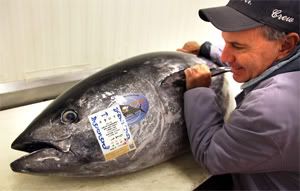
photo credit Laurence Kesterson
Well damn, and we were told it couldn't be done.
""All populations of bluefin tuna are being caught faster than they can reproduce," according to Monterey Bay Aquarium's Seafood Watch."
But the people love tuna. So what will be done about a favourite sushi menu item? Well, Japan's Kinki University's Fisheries Laboratories might just have an answer.
"Kindai tuna are farmed, rather than ranched: raised to maturity from wild bluefin eggs, which ensures genetic diversity. Mediterranean, South Australian, and Mexican tuna ranchers capture juvenile fish, raise them in net pens, and often ship them to market before they are mature enough to reproduce. Critics say ranching doesn't help rebuild stocks, though the higher prices they fetch help fishermen."
Mmkay, some input. Ideas to stop the over-harvesting of bluefin tuna: great. Farming fish: potentially good, depending on how you manage your wastes and ensure genetic diversity. The fact that these are wild eggs is a plus. Pen-raised fish: probably bad, as it leads to a lot of waste creation and potentially stressful living conditions for the fish. Sending them to market before they reproduce: probably good, since the genetic diversity won’t be impaired after years of breeding the same stock of fish over and over again. Will this restore stocks? No, but I don't think that's the point. I think the point is to take the stress off removing wild tuna from the environment, and this will do that.
Is this the end-all of the bluefin tuna debate? No. But I think it's a step in the right direction.
Want more information about choosing a sustainable fish? Check out the post on sustainable seafood!
Full article here (The Philadelphia Inquirer)